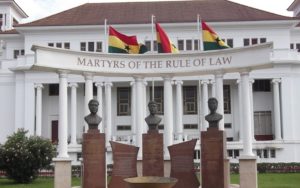A seven member Supreme Court panel presided over by Justice Sophia Adeniyira has set the 28th of November 2018, as date for its ruling in the case challenging the constitutionally of government’s decision to create six (6) new regions.
The Applicants in the action, Mayor Agebleze, Destiny Awlimey and Jean-Claude Amenyaoglo, are essentially seeking interpretation of the Article 5(4) of the 1992 Constitution, which states;
“Where a commission of inquiry appointed under clause (2) and (3) of this article finds that there is the need and a substantial demand for the creation, alteration or merger referred to in either of those clauses, it shall recommend to the President that a referendum be held, specifying the sues to be determined by the referendum and the places where the referendum should be held”.
It is their argument that the recommendations of the Justice Brobbey Commission that the upcoming referendum should be carried out in the areas affected by the proposed regions and not the entire regions affected by the possible division is unconstitutional.
Today in Court, Deputy Attorney General, Godfred Yeboah Dame, representing the State, lawyer for the Electoral Commission, Justin Amenuvor, and Albert Quashigah, lawyer for the applicant all told the Supreme Court that they rely entirely on the addresses they have filed in Court.
In the written address filed by lawyers of the EC, they argued that “what the Plaintiffs in the case are asking the Supreme Court to do is to twist, alter and insert words into clear, precise and unambiguous provisions of the constitution so as to substitute their preferred recommendation for that of a constitutionally mandated Commission that has exercised its powers and discretion within the confines of the law”.
“we submit that this is an unnecessary invitation to this court; it is not supported by our constitutional provisions or the jurisprudence of this court and we invite Your Lordships to decline this invitation. My Lords we submit that on this point alone, this action ought to be dismissed in limine and with costs” the address said.
The Deputy Attorney General in his argument in the written address submitted that “the plaintiffs through the invocation of this Court’s original jurisdiction, subtly seek a review of how the article 5 commission set up by the President as well as the EC, discharged the duties cast on it by the Constitution. We submit that the duties of an article 5 commission and the EC under article 5 of the Constitution are not reviewable by any person or authority, save in the case of a violation of the law or Constitution. Where the Constitution has placed a duty on a person or authority, that duty must be performed. The performance of that duty is not questionable in the absence of an excess of the powers conferred by the Constitution or other forms of illegality committed by that person or authority. Plaintiffs have woefully failed to show any such unconstitutionality or illegality, and therefore the instant action ought to be dismissed”.
The Deputy Attorney General concluded by saying that “for failure to satisfy the essential requisites for an invocation of the Court’s original jurisdiction under articles 2(1) and 130(1), the instant action is devoid of a cause of action, and ought to be dismissed”.
At the last court sitting, the seven-member Supreme Court panel, dismissed a contempt application instituted against the Chairperson of the Electoral Commission (EC), Jean Mensa, and the Attorney General (AG), Gloria Akuffo, for going ahead with the limited voter registration exercise which took place from the 16th to the 25th of September, 2018, in the areas recommended by the Commission of Inquiry into the creation of new regions.
–
kasapa fm




